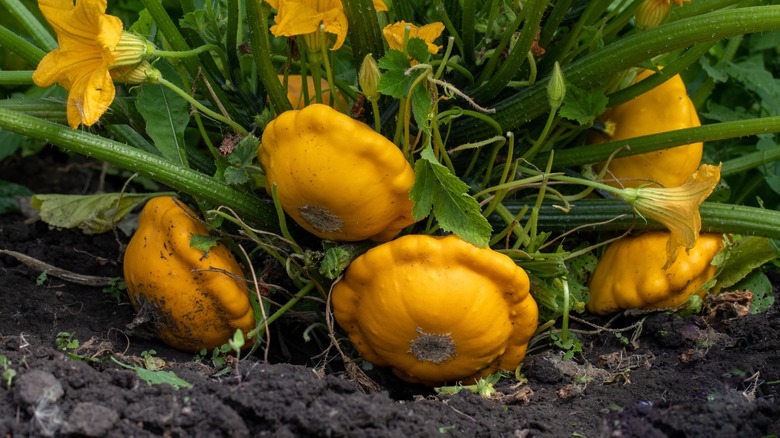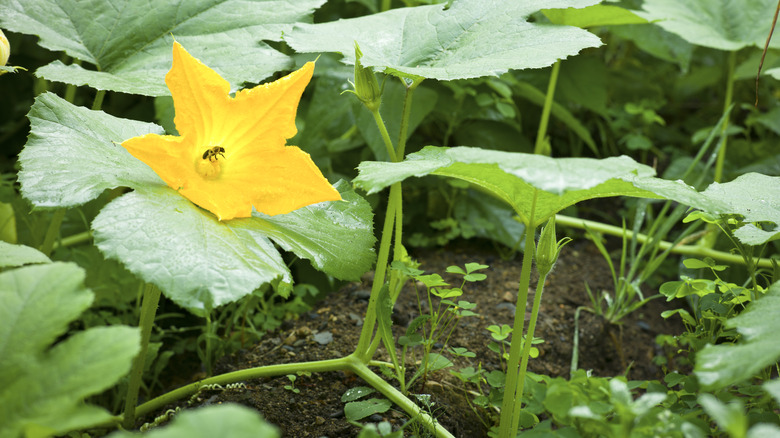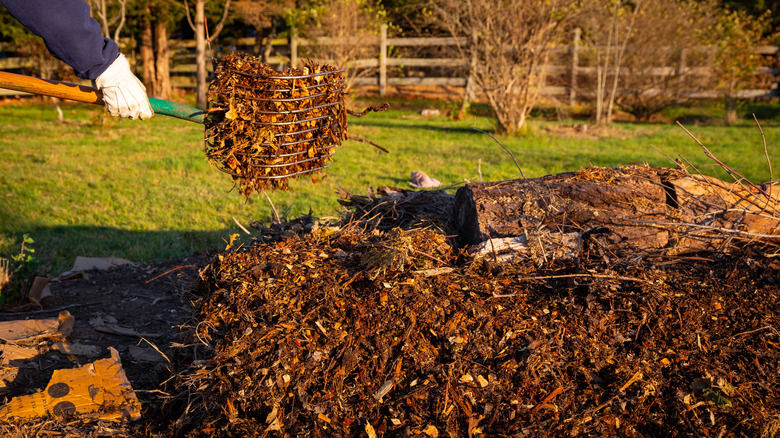The Unexpected Reason You Want To Avoid Tilling Soil Around Squash
Tilling is a common practice in the garden. It helps you clear out old plants to make room for new ones and allows you to break up the soil so it's more workable. Though tilling makes gardening easier for you, it's actually pretty damaging to the most valuable squash pollinator: the squash bee. These bees specialize in squash family plants and build their nests underneath them. When you till the soil, you till their homes and potentially reduce the population in your garden.
You might spot other bees on your squash flowers, but they aren't nearly as helpful as the squash bees. Bumble bees, honey bees, and others are looking for nectar when they visit the flowers. They aren't out to intentionally pollinate your plants — instead, they accidentally do so when pollen sticks to their legs. Squash bees, however, live and breathe the Cucurbitaceae (squash) family. When you harvest squash, pumpkins, cucumbers, or zucchini, it's most likely due to these bees, so it's important to keep them safe so you can enjoy the vegetable in your garden.
Squash bees live beneath your squash
If you've ever seen a bee sleeping inside a squash flower, then you saw a male squash bee. The males are active in the mornings but hunker down for a midday snooze inside of flowers. The females, however, get the luxury of a nest in the soil with several bedrooms (small tunnels) for each of her children. She digs out her little mansion near or underneath squash plants since Cucurbitaceae pollen is her main source of food to feed her little ones. Though it's not proven yet, research suggests that this pollen is too bitter for other bees, which is why they don't like it. But squash bees love the stuff and have centered their entire lives around it.
Squash bee mothers lay eggs in their nest and raise their larvae throughout summer and fall. The larvae eat up the pollen she collected, grow through winter, and emerge as young bees the following spring. The cycle continues when the bees mate and find a new location to build their nest.
Reduce or change how you till the soil to save bees
When you till the soil around squash plants, you risk disturbing or killing the bees living there. You can do a few things to minimize the damage and keep the bees safe. Tilling the soil as little as possible is a great place to start. A no-till garden is a method that seeks to disturb soil as little as possible and make gardening easier. This can really benefit squash bees, though you may want to forgo using ground covers to control weeds around the squash plants so the bees can have access to soil to build their nests.
If avoiding tilling isn't an option, try to change when you do it. Wait until spring or early summer because that's when mothers are building their new nests. The disturbance will encourage them to build elsewhere. Don't till in late summer, fall, or winter, as that's when eggs hatch and larvae develop. Till small portions at a time if you have a large garden. If you have a couple of locations for squash, you can pick just one of them to till so the bees can stay safe in the other location. When tilling around squash plants (and other squash relatives), till no deeper than 4 inches into the soil. Bees build their nests pretty deep, so keeping toward the top of the nest shouldn't cause too much damage.


